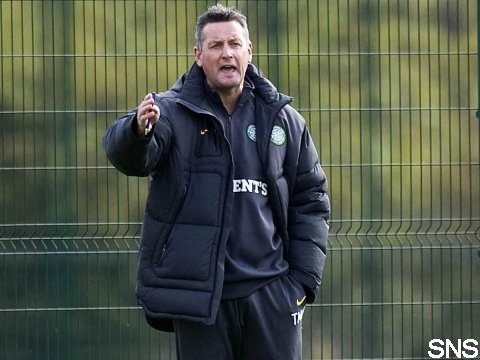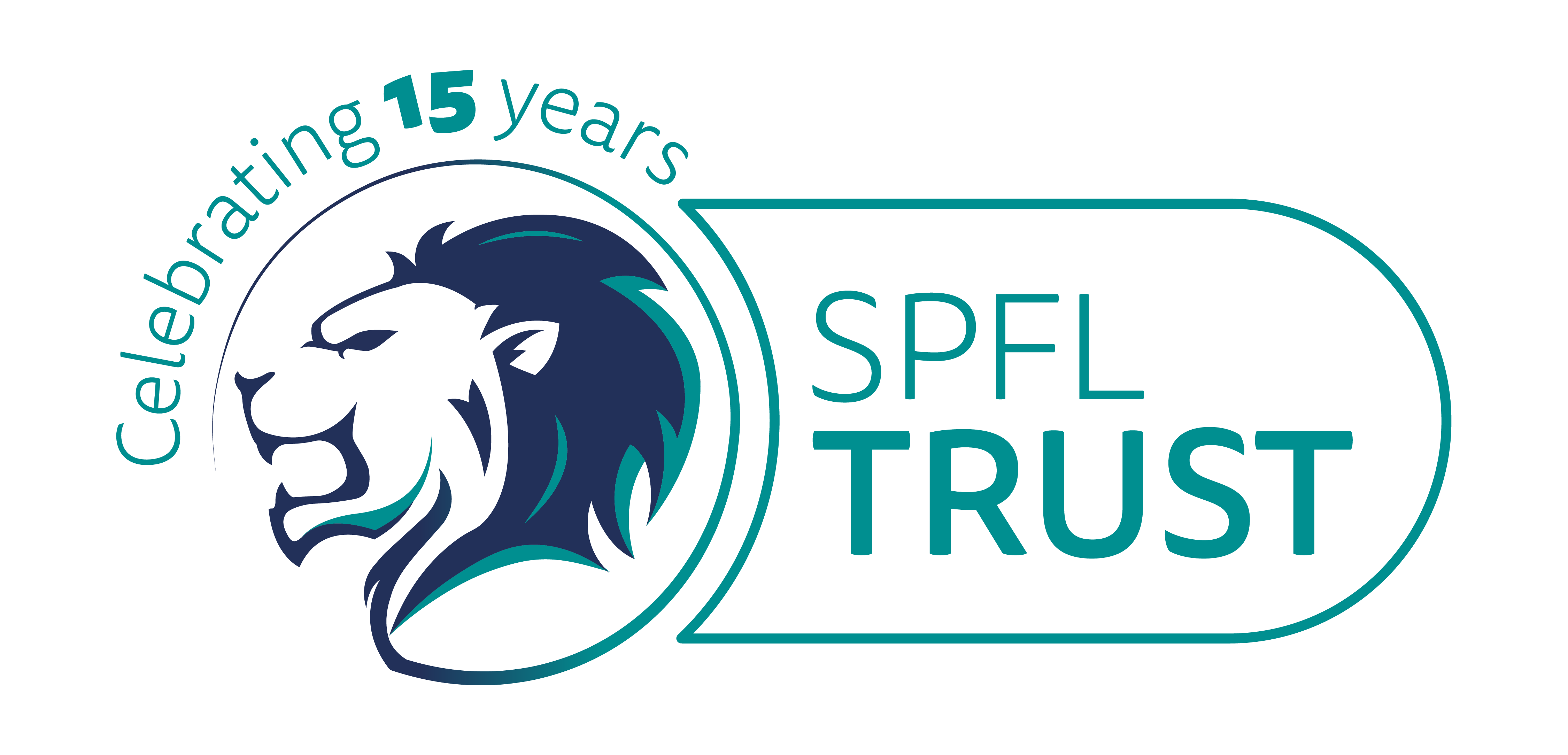In the first part of his interview with the SFL Newsletter, Celtic’s Head of their Professional Academy, Tommy McIntyre, talked of his journey from being a ‘Fergie Fledgling’ at Aberdeen to being a League Cup winning goalscorer for Hibernian.
In this second and final part, McIntyre discusses his move from a playing capacity to a coaching role that actually began long before his boots were hung up.
McIntyre said: “I started getting involved with coaching young players when I was a player at Hibs and I actually secured my ‘A’ Coaching Licence when I was 27. I had been encouraged by my mentors to look at it from a young age and when you consider I worked under a lot of great managers and coaches it was quite an easy decision to make. When you have Sir Alex Ferguson, Archie Knox and Alex Miller telling you to consider getting involved in coaching, well you should really do it.
“These guys recognised the passion in me for coaching and they encouraged it in me. Bearing in mind they were involved in the National set-up down at Largs with Andy Roxburgh it was easy to get drawn in.”
McIntyre started off in humble beginnings as he said: “When I was at Hibs I would go to Hamilton and work alongside Sir Alex’s brother, Martin, with a bunch of kids aged 12 to 14.”
That encouragement saw McIntyre gain more qualifications before he finished playing and he said: “It was a big commitment to make and I had to re-organise things to get there but I managed it. I did my A Licence at the same time as my former Aberdeen team-mates Mark McGhee, Gordon Strachan and Andy Watson so you could see who the key influencers were.”
 Another Pittodrie connection popped up with McIntyre saying: “I got my A Licence under Craig Brown and it was great to learn from him and the Scotland set-up at an early age. Jose Mourinho did his B Licence when I was there and, whilst I did not think about it too much at the time, I do remember having a sneaky look at his assessment sheet.
Another Pittodrie connection popped up with McIntyre saying: “I got my A Licence under Craig Brown and it was great to learn from him and the Scotland set-up at an early age. Jose Mourinho did his B Licence when I was there and, whilst I did not think about it too much at the time, I do remember having a sneaky look at his assessment sheet.
“The SFA are renowned for developing top coaches and I was exposed to that development early in my career and that probably led me to joining them. I was offered coaching jobs when I stopped playing but I had promised myself that I would take a job that I wanted as opposed to taking one for the money.”
It was not just football development that McIntyre was learning as he said: “I got my football qualifications but I realised that I had to develop organisational skills so I went and worked with my local authority as part of a SFA Programme.
“That gave me the tools on the business side of things and that eventually led to the Head of Youth job at the SFA.”
McIntyre turned down further chances to work in the senior game to work with the SFA as he said: “I had chances to go to clubs but the jobs were not for me, I wanted longevity in a role and the SFA job was right for that. I had a hunger and a desire but I had a lot to learn, and I still have, but my timescales for learning would have been different from what a club wanted.
“I wanted to get my hands dirty and as I had always enjoyed developing young players I stuck to that side of things. I worked under Jimmy Sinclair and I loved it as we were responsible for the entire Youth Programme in Scotland where we worked with Elite players and on the education of Coaches.”
 McIntyre’s passport was well stamped at this time as he explained: “I travelled abroad and picked up good practice and then looked to disseminate that when I came back. I also worked with my former coach at Aberdeen, Archie Knox, as an assistant coach with the under-19 side. That was another great learning opportunity as our players were playing against the best sides in Europe.
McIntyre’s passport was well stamped at this time as he explained: “I travelled abroad and picked up good practice and then looked to disseminate that when I came back. I also worked with my former coach at Aberdeen, Archie Knox, as an assistant coach with the under-19 side. That was another great learning opportunity as our players were playing against the best sides in Europe.
“We had some great players coming through at that time including David Goodwillie and James Forrest.”
Things changed again for McIntyre when Sinclair and Tommy Wilson left for Rangers and he was asked to work as an Assistant Director of Football at the SFA alongside Jim Fleeting who was appointed Director.
“It was another level and more responsibility,” said McIntyre before adding, “It was more work with UEFA and also working with Walter Smith, Alex McLeish and George Burley at an international level. There were conferences with the people at the top end of the game and for a coach like me it was an amazing experience. Everyone involved at that level treated the game with great respect and that was fantastic to see.
“You picked up different ways of playing from the likes of Spain and Italy but one thing remained consistent and that was that the Scottish way of educating coaches was fantastic and held in high esteem throughout Europe.”
It is also viewed highly close to home with McIntyre advising: “I passed Alan Shearer on a course and Terry Butcher was another coach to come through the SFA’s system.”
 McIntyre’s work at the National Stadium had not gone unnoticed, although the poacher has turned gamekeeper in that his boss at Celtic, Chris McCart was once a target of McIntyre’s for recruitment at the SFA.
McIntyre’s work at the National Stadium had not gone unnoticed, although the poacher has turned gamekeeper in that his boss at Celtic, Chris McCart was once a target of McIntyre’s for recruitment at the SFA.
“I had tried to get Chris in at the SFA however the roles are reversed here,” said McIntyre before adding, “He is from Cleland, another Lanarkshire boy like me, and there had been a mutual respect between us throughout our playing days and our paths crossed in other ways as well as we had children at much the same age. Chris had been grabbed under my nose by Celtic to join their youth set up at a time when I had wanted to involve him with Scotland.”
The sad passing of Tommy Burns in May 2008 changed things with McIntyre saying: “Chris had been at Parkhead for a while, and been promoted, when I was on holiday in Florence with my wife when a call came through from him asking me into Celtic Park for a chat. Chris said that he may be wasting his time but could I pop in anyway.
“Archie had left by this time and I was heavily involved in the national under-19’s so I had lots to enjoy there. Chris asked me to come on-board at Celtic, and I was honoured, but he also recognised that I already had a good job.”
After some soul searching McIntyre said: “Deep down I knew I wanted to do it but I felt I had to speak to my family first. The regular contact with players appealed to me as with internationals squads you get a short buzz of excitement with players and then they are gone.
“If you get a bad result you could not work on anything and get things out of your system and to be honest it was also an honour and a privilege to be asked. I knew that if I never took it I would have regretted it. Despite being secure in my job at Hampden, I was happy giving that up for an environment that I did not fully know.
 “My viewpoint was that I will take the challenge and if it does not work out I will have no regrets.”
“My viewpoint was that I will take the challenge and if it does not work out I will have no regrets.”
McIntyre went through a lengthy interview process with Celtic Chief Executive Peter Lawwell where the future of the game and Celtic’s vision for their role in it was discussed and McIntyre said: “All in all it lasted 3 hours and whetted my appetite all the more.”
Celtic split their development of players into recognisable stages starting at the Youth Academy which has three sections, a Junior Academy, an Intermediate Academy and a Professional Academy before players progress to the Development Squad and then the First Team.
McIntyre heads up the Professional Academy with sides at under 17 and under 19 level and he said: “We have a real mix of stages as we have boys that are joining us after just leaving school and looking to form a career in full time football. You also have players who have had a year in full time football and then more experienced players who have been in for a couple of years and are getting pushed towards mixing with first team players.”
“We are looking to stretch the players at the Professional Academy to be able to go beyond under-19 football and into the Development Squad and then onto the first team. This season we have great success with 4 boys playing in the first team from a Professional Academy age group with Marcus Fraser, Paul George, Philip Twardik and Dylan McGeough having played a few times in the first team and also becoming regulars in the Development squad.”
 McIntyre added: “They can still play at under-19 level and did that for us in the Next-Gen Series against Manchester City, Barcelona and Marseilles. We did okay in that competition and defeated Marseilles 3-0 in our group and they are now in the semi-finals.”
McIntyre added: “They can still play at under-19 level and did that for us in the Next-Gen Series against Manchester City, Barcelona and Marseilles. We did okay in that competition and defeated Marseilles 3-0 in our group and they are now in the semi-finals.”
“We also like to bring in under-17’s to give them the experience of stepping up in domestic and European games, although it is always a difficult thing to gauge. Bridging the gap between youth and first team football is a difficult one to conquer both in Scotland and worldwide. You have to decide when to bring the kids in and when to bring them out and when to bring them back in and hope they can sustain it.”
McIntyre is supported by some well-known faces with former Scotland centre half John Kennedy joining up this season and former Dundee United and Motherwell defender Miodrag Krivokapic bringing the experience he learned at Red Star Belgrade with one-time Ayr United and Kilmarnock striker John Sludden also involved.
McIntyre said: “It is a really good mix with great enthusiasm aligned to great experience and we have done well this season in providing players for Stevie Frail’s Development squad.
“Callum McGregor, Joe Chalmers and Tony Watt have all been in the Development Squad and made it onto the bench for the first team. It is always good to see players you have known from 15 making it all the way.”
There is no time for sitting back admiring recent achievements all the same as McIntyre said: “It is hard work and a lot of pressure but I love it. It hurts when things do not go well and you take it personally when that happens. Chris has pulled together a great coaching team that work well but we never rest as we are always looking for that edge.”
 The Celtic first team squad have reached the Final of this season's Scottish Communities League Cup Final and McIntyre was asked what the sponsor’s message of ‘Respect, Responsibility and Tolerance’ meant at a Youth level and he replied, “We give messages like that tremendous importance from the very early days of a player joining our Academy. It is too late to filter these things into players at 17, it simply must happen earlier. We expect our players to have a great level of discipline both on and off the park.”
The Celtic first team squad have reached the Final of this season's Scottish Communities League Cup Final and McIntyre was asked what the sponsor’s message of ‘Respect, Responsibility and Tolerance’ meant at a Youth level and he replied, “We give messages like that tremendous importance from the very early days of a player joining our Academy. It is too late to filter these things into players at 17, it simply must happen earlier. We expect our players to have a great level of discipline both on and off the park.”
McIntyre continued: “If we get discipline off the pitch we will get discipline on it. For instance we expect our players to respect referees, it is okay to contest decisions but not to question them.
“Every player here shakes hands with their coaches and I do that with the 11 and 12 year olds even though I do not work with them and all that leads to Celtic being a great environment to work in.”
McIntyre finished by saying: “We expect our players to be humble but unfazed as they move through the grades as they have been moving towards a first team place from a young age.”






.png)












